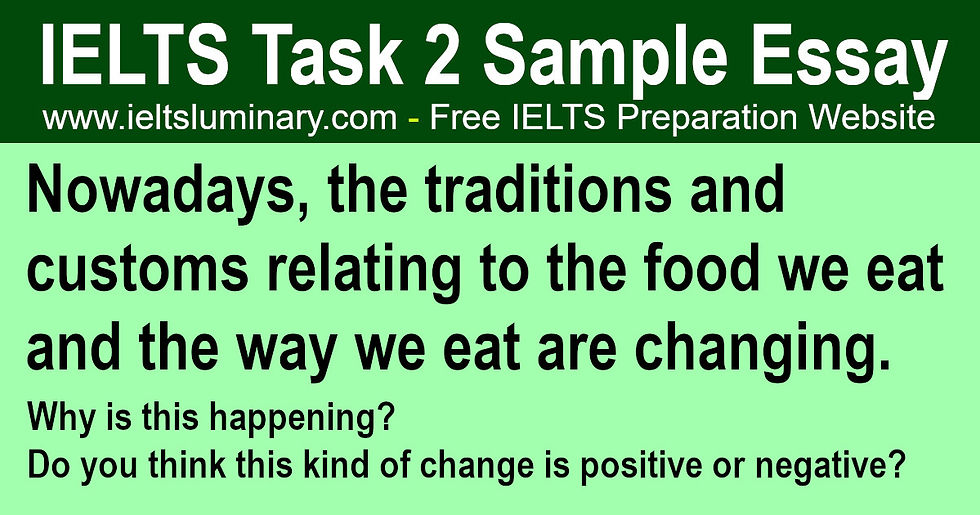The Traditions And Customs Relating To The Food Are Changing - IELTS Band 9 Essay
- IELTS Luminary

- Jun 2, 2024
- 3 min read

Get your personalised IELTS Essay Feedback from a former examiner
Download IELTS eBooks, get everything you need to achieve a high band score
Sample Essay 1
Recent shifts in our food-related traditions and customs are primarily influenced by globalization and technological advancements. I contend that these changes are predominantly positive, enhancing cultural understanding and dietary variety, despite some negative health implications. This essay will explore the driving forces behind these changes and critically assess their impacts.
One principal reason for the transformation in food-related customs is globalization. As people migrate and cultures intersect, there is a natural exchange of culinary practices. For instance, the widespread popularity of sushi outside Japan, and the global love for Italian pizza, exemplify how global influences can enrich a nation’s food palette. This culinary cross-pollination encourages diversity and broadens individual tastes, fostering a deeper understanding and appreciation among different cultures. Moreover, globalization has led to increased availability of foreign ingredients, making it easier and more affordable for people to experiment with new recipes and dishes at home. This accessibility not only transforms local diets but also promotes a global palate, integrating diverse flavours and techniques into everyday meals.
Additionally, technological advancements have significantly altered the way we produce and consume food. The advent of high-tech kitchen gadgets and the proliferation of food delivery apps, such as UberEats and DoorDash, exemplify this trend. These technologies offer unparalleled convenience, allowing for diverse dining options with minimal effort. However, this shift towards convenience can also lead to negative outcomes, such as decreased cooking skills among younger generations and a troubling increase in disposable packaging waste. Furthermore, the reliance on processed and ready-made meals can contribute to health issues, including obesity and diabetes, due to high caloric and low nutritional contents. Such technological conveniences, while simplifying food preparation, also risk diminishing the traditional culinary arts and fostering a less health-conscious society.
In conclusion, though there are some health challenges due to increased consumption of processed foods, the evolution of our eating habits, spurred by global cultural exchanges and technological ease, generally benefits society by enriching diets and enhancing intercultural appreciation.
Download IELTS eBooks, get everything you need to achieve a high band score
Sample Essay 2
Globally, there has been a noticeable shift in culinary traditions and dining habits, driven by rapid urbanization and increased health awareness. This essay argues that such changes are largely beneficial, as they promote healthier lifestyles and increased environmental consciousness, though they may also lead to the erosion of traditional cuisines.
Urbanization significantly reshapes eating habits as populations migrate towards metropolitan areas. This urban shift leads to a higher reliance on fast food and restaurant dining, which suits the fast-paced lifestyle of city residents. The proliferation of diverse food outlets in urban centres—from American fast food to Asian street food—promotes a rich tapestry of global cuisines, encouraging residents to expand their culinary experiences. This integration enriches the cultural landscape of cities but can also dilute the presence and value of traditional local dishes, which may become less popular or even forgotten amidst the global offerings. These local cuisines often struggle to compete with the convenience and broad appeal of international flavours, potentially leading to a loss of culinary heritage.
The increasing emphasis on health and sustainability has transformed contemporary food customs significantly. Driven by environmental concerns and health motivations, more people are choosing organic and locally sourced foods. This shift is emblematic of the farm-to-table movement, which bolsters local farming by ensuring that the food provided to consumers is both fresh and free from harmful chemicals. By supporting this sustainable practice, consumers contribute to a smaller carbon footprint and encourage nutritional diets, diminishing reliance on unhealthy processed foods. However, despite these benefits, the higher costs and limited availability of these healthful options can restrict their impact, often making them accessible only to wealthier individuals. This economic barrier may prevent widespread adoption of sustainable eating practices, thereby limiting their potential benefits to a broader audience.
In essence, the evolution of our food traditions due to urbanization and health consciousness is proving to be largely advantageous, offering a blend of global flavours and promoting sustainable, healthy living. However, it challenges the preservation of indigenous culinary practices, presenting a complex scenario of cultural integration and adaptation.
Get your personalised IELTS Essay Feedback from a former examiner
Download IELTS eBooks, get everything you need to achieve a high band score



